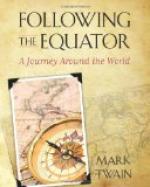“Sir,
“I pray please to give me some action (work) for I am very poor boy I have no one to help me even so father for it so it seemed in thy good sight, you give the Telegraph Office, and another work what is your wish I am very poor boy, this understand what is your wish you my father I am your son this understand what is your wish.
“Your Sirvent, P. C. B.”
Through ages of debasing oppression suffered by these people at the hands of their native rulers, they come legitimately by the attitude and language of fawning and flattery, and one must remember this in mitigation when passing judgment upon the native character. It is common in these letters to find the petitioner furtively trying to get at the white man’s soft religious side; even this poor boy baits his hook with a macerated Bible-text in the hope that it may catch something if all else fail.
Here is an application for the post of instructor in English to some children:
“My Dear Sir or Gentleman, that your Petitioner has much qualification in the Language of English to instruct the young boys; I was given to understand that your of suitable children has to acquire the knowledge of English language.”
As a sample of the flowery Eastern style, I will take a sentence or two from along letter written by a young native to the Lieutenant-Governor of Bengal—an application for employment:
“Honoredand much respected sir,
“I hope your honor will condescend to hear the tale of this poor creature. I shall overflow with gratitude at this mark of your royal condescension. The bird-like happiness has flown away from my nest-like heart and has not hitherto returned from the period whence the rose of my father’s life suffered the autumnal breath of death, in plain English he passed through the gates of Grave, and from that hour the phantom of delight has never danced before me.”
It is all school-English, book-English, you see; and good enough, too, all things considered. If the native boy had but that one study he would shine, he would dazzle, no doubt. But that is not the case. He is situated as are our public-school children—loaded down with an over-freightage of other studies; and frequently they are as far beyond the actual point of progress reached by him and suited to the stage of development attained, as could be imagined by the insanest fancy. Apparently—like our public-school boy—he must work, work, work, in school and out, and play but little. Apparently—like our public-school boy—his “education” consists in learning things, not the meaning of them; he is fed upon the husks, not the corn. From several essays written by native schoolboys in answer to the question of how they spend their day, I select one—the one which goes most into detail:




